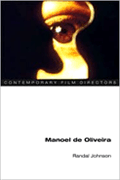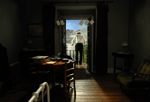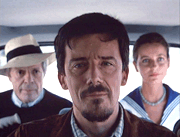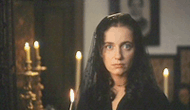In Manoel de Oliveira, Randal Johnson’s comprehensive and informative critical evaluation of the Portuguese filmmaker’s body of work for the Contemporary Film Directors series, Johnson insightfully points out that the first 43 years of Oliveira’s film career coincides with the repressive, right wing regime of António de Oliveira Salazar and Estado Novo, an era of […]
Tag: Manoel de Oliveira
The Strange Case of Angelica, 2010
The retrospective screening of Manoel de Oliveira’s Acto da Primavera alongside his latest film, The Strange Case of Angelica provided a great opportunity to see the evolution – or rather, reconstitution – of his cinema from documentary to narrative fiction. Indeed, by evoking images from his first film, Douro, Faina Fluvial in Isaac’s (Ricardo Trepa) […]
Eccentricities of a Blond Hair Girl, 2009
Inasmuch as Eccentricities of a Blond Hair Girl returns to Manoel de Oliveira’s recurring theme of doomed love, the film also embodies Oliveira’s preoccupation with subjectivity and modes of representation. On one level is the adaptation of Eça de Queiroz’s literary work into a screenplay, retaining a degree of formalism and dramatic structure associated with […]
Belle Toujours, 2006
Ostensibly an homage to the principal creators of Belle de Jour, filmmaker Luis Buñuel and screenwriter Jean-Claude Carrière, Belle Toujours is, nevertheless, a quintessential Manoel de Oliveira film: formalist, dramaturgic, contemplative, and discursive. Continuing where Buñuel’s film left off 38 years earlier, after the sadistic scoundrel Henri Husson (Michel Piccoli) would whisper an undisclosed secret […]
Voyage to the Beginning of the World, 2004
On the overgrown grounds of an abandoned and dilapidated health resort ironically called The Grand Hotel of Pezo on the outskirts of the Portuguese town, the aging filmmaker, Manoel (Marcello Mastroianni) recounts a familiar tale by a Brazilian author named Catulo Searence of a poet living in a hut overlooking the river who would diligently […]
Abraham’s Valley, 1993
A genial country doctor, Carlo Paiva (Luís Miguel Cintra) strikes up a polite conversation with a privileged widower named Paulino Cardeano (Ruy de Carvalho) at a dining hall and is immediately captivated by the beguiling, almost forbidding presence of Cardeano’s mannered, but inscrutable adolescent daughter Ema (Cécile Sanz de Alba). But Carlo is neither the […]





